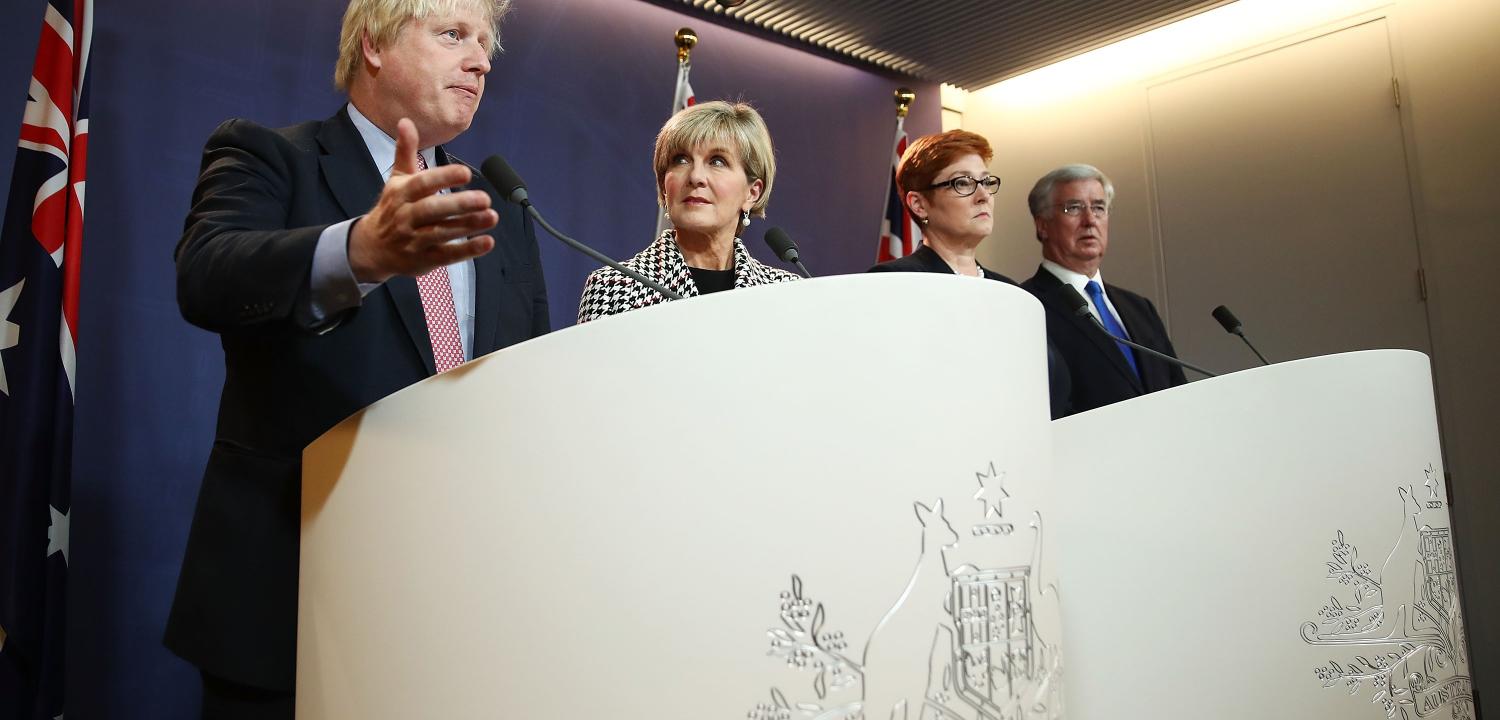This article is part of a series for the Australia-UK Asia Dialogue, co-hosted by the Lowy Institute and Ditchley Foundation, and supported by the Department of Foreign Affairs and Trade and the Foreign and Commonwealth Office.
There should be plenty of scope for cooperation between Australia and the UK for upholding a rules-based international order in the Asia Pacific.
Aside from the commitment to shared values that derives from their special historical relationship, both remain committed to regional security cooperation through the Five Power Defence Arrangement. The UK maintains a defence garrison in Brunei. Australia and the UK also work with New Zealand, the US and Canada as members of the Five Eyes partnership on intelligence sharing and law enforcement.
This should provide a solid foundation for contributing to the widely-shared goal of building a rules-based regional order. Even China's 2017 white paper on cooperation in the Asia Pacific states a determination to promote 'rule-setting and improve the institutional safeguards for peace and stability', including support for institutions such as UNCLOS.
When China's Xi Jinping addressed the Chinese Communist Party's national congress in October, however, he had no qualms in claiming construction on the disputed islands in the South China Sea as one of his administration's major economic achievements. Such messages raise the question of whether his promise to promote humanity's 'community of shared destiny' is little more than code for the unilateral remaking of international rules.
Reacting to this challenge is made more difficult by US President Donald Trump's 'America first' stance, evident in his withdrawal from the Trans Pacific Partnership and forcefully expressed during his recent tour of the Asia Pacific. Pressure for increasing US arms sales, fiery rhetoric towards North Korea and the growing likelihood of a trade war with China are some of the more prominent signs of a US unilateralism that has serious implications for Australia and the UK.
One need only consider the importance of the sea lanes that run through the Asia Pacific to understand why neither Australia nor Britain can allow regional order to be shaped by what Beijing calls its 'new mode of great power relations' with the US. Moreover, the challenges of a globalised world are just too complex for a Chinese Munroe Doctrine, or the backlash this might provoke from Washington.
This complexity is particularly evident in Australia's economic dependence on China, which has made it something of a laboratory for the buying of foreign influence in its political, media and academic life. The UK can learn much from this, as issues such as Chinese investment in its critical national infrastructure become more controversial. The lacklustre response to China's trashing of its Joint Declaration with the UK on the future of Hong Kong as 'history and a matter of no practical significance' this summer was a painful reminder of how China's growing wealth translates into an increasingly open posture of 'might is right'.
Dealing with such complex problems requires diplomacy as well as military cooperation. Playing the role of a middle power in shaping the rules-based order is not new for Australia, and both it and the UK have substantial contacts and experience of working with both China and the US. They should have gained additional traction in Beijing as founding members of its Asian Infrastructure Investment Bank. This political and diplomatic capital should be used to send a united message of support for those in Beijing and Washington who understand that the rules-based order has served their countries well and continues to be the best way to manage the rise of China.
The success of this two-pronged strategy requires public and cross-party support in domestic politics. This has been growing in Australia, thanks largely to media revelations about the scale of Chinese influence. The UK's 2015 National Security Strategy also promises a greater engagement in the Asia Pacific, including the despatch of its new aircraft carrier. Whether this is sustainable depends on how the current political turmoil surrounding Brexit works out.
Advocates of 'global' Britain promise to rebuild relations with the Commonwealth countries and have a greater presence in regions such as the Asia Pacific. However, the suspension of the House of Commons select committee on relations with China since the UK's snap general election in June is not a good sign. The political turmoil in the UK, including the resignation of Defence Minister Michael Fallon in November, also raises questions over the feasibility of strategic thinking, when the future of the government is uncertain.
Problems with the UK economy will also put downward pressure on spending on defence and foreign aid. As the government has to show progress on the bilateral trade agreements with China and the US that it has promised to deliver, it will have less incentive to align with other states and organisations to challenge Beijing or Washington. This makes it vital for Australia to use its special relationship with the UK to add its voice to the chorus of those who want to ensure that maintaining the rules-based order becomes a more prominent issue in the unfolding debate.

